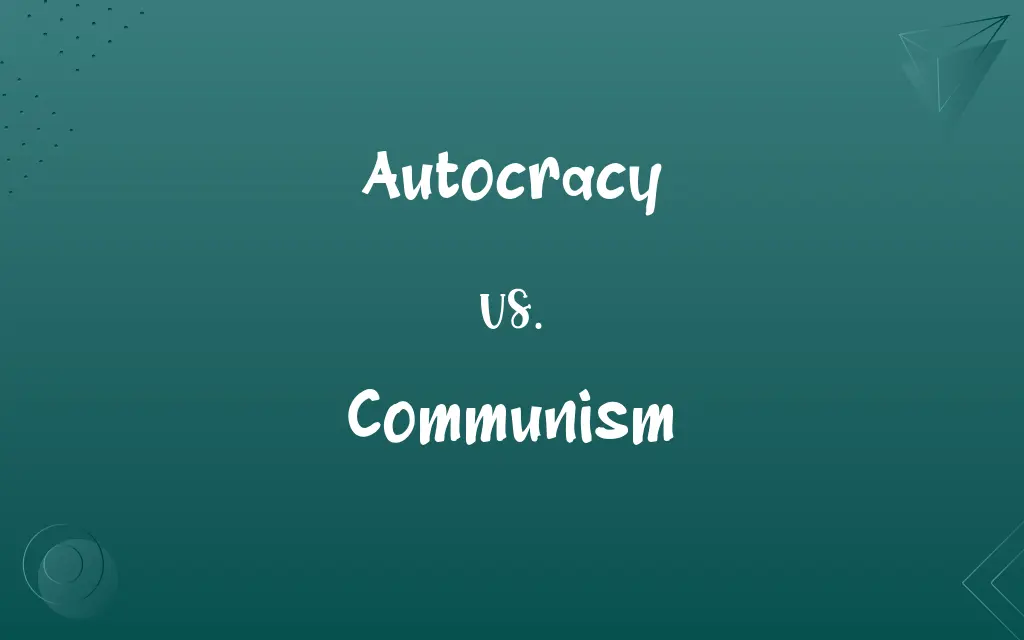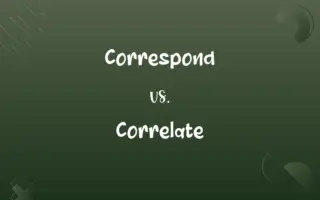Autocracy vs. Communism: Know the Difference

By Shumaila Saeed || Updated on December 25, 2023
Autocracy is a system where one person holds absolute power. Communism is a political and economic ideology aiming for a classless, stateless society and common ownership of resources.

Key Differences
Autocracy is a political system characterized by the concentration of power in the hands of a single individual, typically without effective constitutional limitations. The autocrat exercises complete control over the state and its institutions, often ruling by decree and without the consent or input of the populace. Communism, on the other hand, is an ideology based on the communal ownership of property and the means of production, advocating for a classless and stateless society where resources and power are distributed equally.
Shumaila Saeed
Dec 05, 2023
In an autocracy, decision-making is centralized and top-down, with the autocrat making decisions unilaterally. This often results in a lack of political pluralism and individual freedoms. In contrast, communism aspires to a society where decisions are made communally, ideally with equal participation from all members of the society, though in practice, many communist states have also exhibited autocratic characteristics.
Shumaila Saeed
Dec 05, 2023
Autocracy typically focuses on maintaining the power and authority of a single ruler, which can lead to authoritarian governance and suppression of opposition. Communism, theoretically, seeks to eliminate all forms of political and economic hierarchy, aiming to establish a society where all individuals contribute to and benefit equally from the collective wealth.
Shumaila Saeed
Dec 05, 2023
The economic structure under autocracy can vary, but it often involves state control or significant state influence over the economy, guided by the preferences and decisions of the autocrat. In communism, the economy is based on the principle of communal ownership, with the goal of abolishing private property and distributing resources according to need.
Shumaila Saeed
Dec 05, 2023
Culturally, autocracy often results in a singular narrative or ideology being promoted by the state, with limited tolerance for dissent or alternative viewpoints. Communism aims for a culture that is free from class distinctions and promotes a collective ethos, although in practice, communist states have often ended up restricting cultural and ideological diversity.
Shumaila Saeed
Dec 05, 2023
ADVERTISEMENT
Comparison Chart
Political Structure
Power in one person's hands
Ideology for a classless society
Shumaila Saeed
Dec 05, 2023
Economic System
Varies, often state-controlled
Communal ownership of resources
Shumaila Saeed
Dec 05, 2023
Societal Goal
Maintain power of the ruler
Establish a stateless, classless society
Shumaila Saeed
Dec 05, 2023
Cultural Impact
Singular state narrative
Aims for class-free, collective culture
Shumaila Saeed
Dec 05, 2023
ADVERTISEMENT
Autocracy and Communism Definitions
Autocracy
Rule by a despot with absolute power.
The autocracy was essentially a despotism, with no freedom for the people.
Shumaila Saeed
Dec 05, 2023
Communism
Economic system with communal ownership of resources.
Under communism, all land and resources were owned collectively.
Shumaila Saeed
Dec 05, 2023
Autocracy
A system where a single leader has complete control.
Under his autocracy, the dictator made all national decisions.
Shumaila Saeed
Dec 05, 2023
Communism
Distribution of resources according to need.
Communism sought to distribute wealth according to each person's needs.
Shumaila Saeed
Dec 05, 2023
Autocracy
A government with strict obedience to an authority.
The autocracy was marked by strict censorship and surveillance.
Shumaila Saeed
Dec 05, 2023
ADVERTISEMENT
Communism
Decision-making by the collective community.
In communism, decisions were ideally made by communal consensus.
Shumaila Saeed
Dec 05, 2023
Autocracy
Government by one person with absolute power.
The kingdom was an autocracy, ruled by a powerful monarch.
Shumaila Saeed
Dec 05, 2023
Communism
An ideology aiming for a society without class divisions.
Communism aspired to create a world where class distinctions were eliminated.
Shumaila Saeed
Dec 05, 2023
Autocracy
A system of centralized control over all aspects of life.
The autocracy developed into a totalitarian regime.
Shumaila Saeed
Dec 05, 2023
Communism
An ideology advocating for the abolition of the state.
Communism's ultimate goal was a stateless society, governed by the community.
Shumaila Saeed
Dec 05, 2023
Communism
A theoretical economic system characterized by the collective ownership of property and by the organization of labor for the common advantage of all members.
Shumaila Saeed
Oct 19, 2023
Autocracy
A country or state that is governed by a single person with unlimited power.
Shumaila Saeed
Oct 19, 2023
Communism
A system of government in which the state plans and controls the economy and a single, often authoritarian party holds power, claiming to make progress toward a higher social order in which all goods are equally shared by the people.
Shumaila Saeed
Oct 19, 2023
Autocracy
(uncountable) A form of government in which unlimited power is held by a single individual.
Shumaila Saeed
Oct 19, 2023
Communism
The Marxist-Leninist doctrine advocating revolution to overthrow the capitalist system and establish a dictatorship of the proletariat that will eventually evolve into a perfectly egalitarian and communal society.
Shumaila Saeed
Oct 19, 2023
Communism
Any far-left political ideology or philosophy advocating holding the production of resources collectively, especially by seizing it through revolution.
Shumaila Saeed
Oct 19, 2023
Autocracy
Independent or self-derived power; absolute or controlling authority; supremacy.
The divine will moves, not by the external impulse or inclination of objects, but determines itself by an absolute autocracy.
Shumaila Saeed
Oct 19, 2023
Communism
Any political social system that implements a communist political philosophy.
Shumaila Saeed
Oct 19, 2023
Autocracy
Supreme, uncontrolled, unlimited authority, or right of governing in a single person, as of an autocrat.
Shumaila Saeed
Oct 19, 2023
Communism
The international socialist society where classes, money, and the state no longer exist.
Shumaila Saeed
Oct 19, 2023
Autocracy
Political independence or absolute sovereignty (of a state); autonomy.
Shumaila Saeed
Oct 19, 2023
Communism
A scheme of equalizing the social conditions of life; specifically, a scheme which contemplates the abolition of inequalities in the possession of property, as by distributing all wealth equally to all, or by holding all wealth in common for the equal use and advantage of all.
Shumaila Saeed
Oct 19, 2023
Autocracy
The action of the vital principle, or of the instinctive powers, toward the preservation of the individual; also, the vital principle.
Shumaila Saeed
Oct 19, 2023
Autocracy
A political theory favoring unlimited authority by a single individual
Shumaila Saeed
Oct 19, 2023
Repeatedly Asked Queries
What is autocracy?
Autocracy is a system where one person holds absolute power over the state.
Shumaila Saeed
Dec 05, 2023
Is communism practiced as theorized?
In reality, many communist states have deviated from the original ideological principles.
Shumaila Saeed
Dec 05, 2023
What does communism aim for?
Communism aims for a classless, stateless society with communal ownership of resources.
Shumaila Saeed
Dec 05, 2023
Can autocracy be democratic?
By definition, autocracy opposes democratic principles of governance.
Shumaila Saeed
Dec 05, 2023
Can autocracy have a legal framework?
Yes, but often the autocrat's decisions override legal frameworks.
Shumaila Saeed
Dec 05, 2023
How does leadership work in autocracy?
In autocracy, leadership is centralized and often inherited or seized by force.
Shumaila Saeed
Dec 05, 2023
What is the role of the state in communism?
Communism envisions an eventual dissolution of the state.
Shumaila Saeed
Dec 05, 2023
How does communism impact economic policies?
Communism radically alters economic policies to prioritize communal ownership and distribution.
Shumaila Saeed
Dec 05, 2023
What freedoms are affected in autocracy?
Autocracy often suppresses political, civil, and individual freedoms.
Shumaila Saeed
Dec 05, 2023
Can autocracy be benevolent?
It's possible, but power concentration often leads to abuse and corruption.
Shumaila Saeed
Dec 05, 2023
How does autocracy impact society?
Autocracy often leads to social and political stagnation and repression.
Shumaila Saeed
Dec 05, 2023
Are communist societies always egalitarian?
In theory, yes, but in practice, inequalities can still exist.
Shumaila Saeed
Dec 05, 2023
How does communism address private property?
Communism advocates for the abolition of private property.
Shumaila Saeed
Dec 05, 2023
How does communism view individual rights?
Communism prioritizes collective rights over individual rights, though this can vary in practice.
Shumaila Saeed
Dec 05, 2023
Do communist societies have leaders?
Yes, but in theory, leaders are supposed to act as representatives of the collective will.
Shumaila Saeed
Dec 05, 2023
What happens to class distinctions in communism?
Communism seeks to eliminate all class distinctions.
Shumaila Saeed
Dec 05, 2023
How do autocracies handle opposition?
Autocracies often suppress opposition through various means, including force.
Shumaila Saeed
Dec 05, 2023
What is the role of citizens in a communist system?
Citizens are expected to participate actively in communal decision-making and production.
Shumaila Saeed
Dec 05, 2023
Can autocracies have economic diversity?
Yes, the economic structure under autocracy can vary widely.
Shumaila Saeed
Dec 05, 2023
Is censorship common in autocracies?
Yes, autocracies frequently employ censorship to maintain control.
Shumaila Saeed
Dec 05, 2023
Share this page
Link for your blog / website
HTML
Link to share via messenger
About Author
Written by
Shumaila SaeedShumaila Saeed, an expert content creator with 6 years of experience, specializes in distilling complex topics into easily digestible comparisons, shining a light on the nuances that both inform and educate readers with clarity and accuracy.






































































